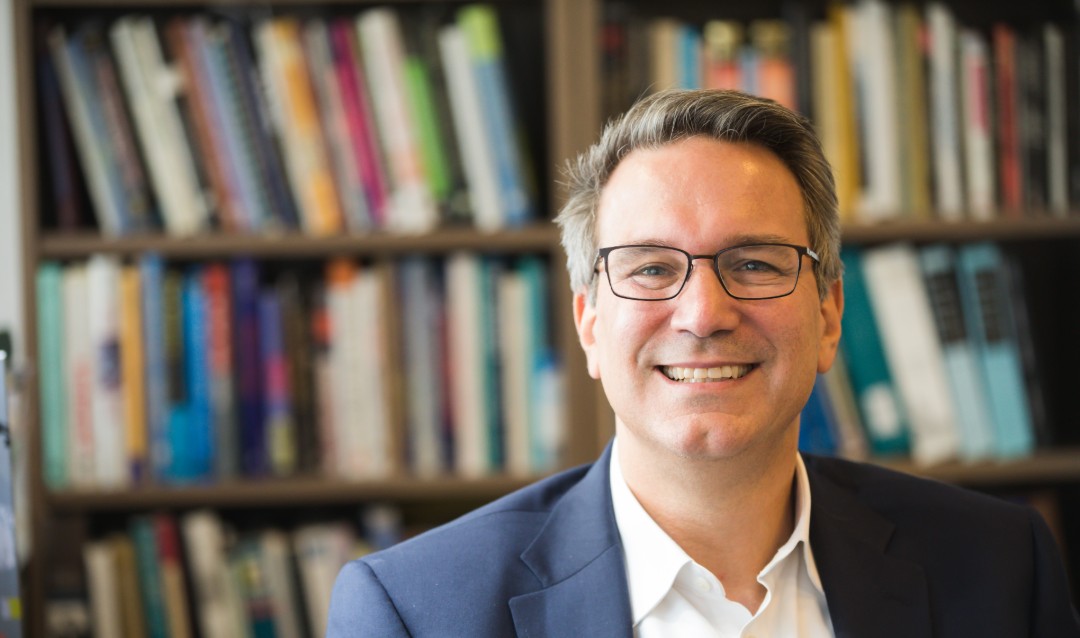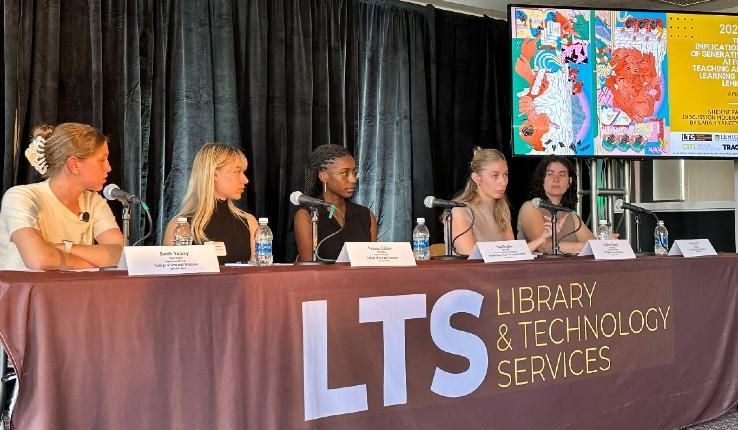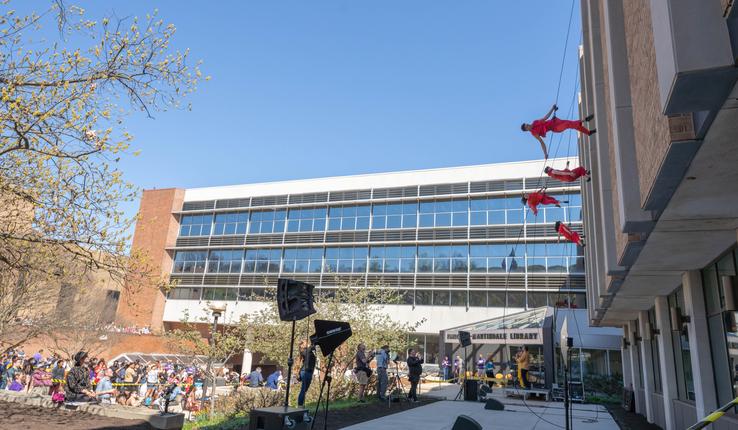Greg Reihman, associate vice provost for Library and Technology Services and director of the Center for Innovation in Teaching and Learning (CITL), has been named vice provost for Library and Technology Services, effective January 1, 2020. He succeeds Bruce Taggart, who will step down in 2020.
“We are pleased that Greg has accepted this new role,” said Provost Pat Farrell. “His many accomplishments over his 15 years with LTS serve as evidence of his commitment to and passion for innovation in teaching, learning and technology at Lehigh. We look forward to his leadership.”
As associate vice provost, Reihman has provided leadership in the renovations of key library spaces, LTS organizational development, budgetary planning, and the creation of strategies for research computing, digital scholarship support, classroom planning and online learning. He has contributed to university-wide strategic planning, assessment and accreditation efforts, and has played key roles in major teaching and learning initiatives at Lehigh, including the Mellon Digital Humanities Initiative, the KEEN Engineering Education initiative, the Creative Inquiry/Mountaintop Program, the Writing Across the Curriculum and TRAC Writing Fellows Programs, the ITaLLIC (Innovations in Teaching Large Lecture Introductory Courses) Project, the iPad Project, and the Global Learning Faculty Fellowship program. Each year, he organizes the New Faculty Orientation, the campus-wide Symposium on Teaching and Learning, a certificate-based program that prepares graduate students as instructors, inclusive teaching workshops, and a broad range of faculty development seminars and communities of practice.
“Greg is a wonderful fit for the vice provost role,” said Ilena Key, chief technology officer. “Over the years that I’ve worked with him, I have seen how Lehigh has benefited from his collaborative and thoughtful approach. I’m confident that he will be successful in leading LTS forward in innovative ways.”
Reihman earned a bachelor’s degree in philosophy from Yale University. Later, while in graduate school at the University of Texas at Austin, he took a yearlong leave of absence to teach English in China. This sparked an interest in teaching and learning that would continue throughout his career.
“[Teaching in China] was the first time that I was in charge of my own classroom and really got to thinking about what it means to help people learn, how to think across cultures, how to engage students and explain complex ideas,” he says.
When he returned to Austin, where he would earn a master’s degree and a Ph.D. in philosophy, Reihman continued to teach, first as a TA and later in his own classes.
“I was fortunate that there was a culture in my department at Texas that generated really rich conversations about teaching,” he explains. “I learned a great deal from my advisors and peers and always sought opportunities to teach and to develop myself in that area.”
A move to Stanford University, where Reihman’s wife, Kristin, a family physician, began medical school in 1998, saw Reihman continuing to embrace such opportunities. At Stanford, he took on the role of program officer and teaching fellow for Introduction to the Humanities, the required course for all first-year students. His work included collaboration with the Stanford Learning Lab, the libraries, IT, and their Center for Teaching and Learning. These partnerships across campus would plant “a seed of the future” in him.
“That was where my academic horizons really began to broaden,” Reihman says. “I started thinking seriously beyond my own discipline because it was an interdisciplinary program. I also learned about program administration and about the role librarians and instructional technologists play in promoting student learning. I also found myself in a faculty development role within that program, helping a group of postdocs and Stanford faculty work together to design and deliver effective courses. And, remember, this was Silicon Valley in the early 2000s, so we were experimenting with new teaching and research technologies, figuring out how to network buildings, design academic websites, and digitize materials, finding all kinds of ways to bring new internet tools into the academic environment. Those conversations reignited my connection to computing—an early interest I had drifted away from—and got me thinking deeply in new ways about technology and how it was shaping not only higher education but also our personal and professional lives. Those experiences continue to inform how I do my job and have given new direction to my own academic research and teaching.”
In 2004 Reihman came to Lehigh, where he served as director of faculty development and co-director of the Lehigh Lab until he was named vice provost for LTS and the founding director of the CITL in 2013. He takes pride, he says, in his role reimagining campus spaces such as Fairchild-Martindale Library and CITL’s physical presence in that building, which includes the Visualization Lab, the Digital Media Studio, the TRAC Fellows’ home, flexible learning classrooms and a DIY recording studio. “Even more important to me, though, are the programs we have developed that bring faculty, students and staff together in these spaces to do great things,” he says.
Another area under Reihman’s direction is research computing, which provides high-performance computing support for faculty researchers. “We were able to establish a model that meets the full range of faculty needs: those of someone who's just getting started learning about [high-performance computing] all the way up to the highest-end researchers,” he says.
In addition to his role in LTS, Reihman currently serves as an adjunct professor of philosophy and co-director of Lehigh’s Humanities Lab. Students in his classroom are often among the first to use academic technologies that Lehigh is piloting. “In my ‘Philosophy and Technology’ course, for example, students and I think together about how new technologies are shaping our approaches to the big questions. We also reflect on and critically evaluate the academic technologies and pedagogies used in the course. I learn a great deal from my students—their feedback is one of the many ways student experience and input shapes the decisions we make as an institution.”
Reihman says his experiences with LTS combined with his experiences as an academic to prepare him for the challenges of his new role.
“A major part of my preparation came from sitting around the table with the LTS Leadership Team. That 15-year education helped me appreciate the complexity experienced by people whose job it is to implement the big ideas,” he says. “It's one thing to identify university needs around networking infrastructure or library materials or administrative systems or classroom technology and then quite another to undertake the complex work that it takes to actually make things happen. I’ve gained an appreciation for the long-term planning, the budgeting, the project management, the importance of communication and collaboration, the nuts and the bolts of getting things done. Bruce Taggart has been an excellent mentor in that area.”
Looking ahead, Reihman says he hopes to initiate even more conversations and collaborations within LTS and across campus, to identify “untapped potential” during this time of growth and change.
“I’d like to seek out even more cross-LTS partnerships in service of the university’s broader goals,” he says. “The talented staff in the library, CITL and technology areas make so many things possible. I’m eager to enhance collaboration between LTS and our many partners among the faculty and administrative units across the university. This starts by hearing what's working and what's not working for people, and helping us all to pause, reflect, analyze and have conversations about how LTS can partner with colleagues across campus to try to help them in their mission-critical work.”
Such conversations, he says, are opportunities to bring multiple perspectives together to find solutions—an important part of his new role.
“It's not just a question of what's good for faculty or what's good for students or what's good for staff, but what good we can do when we bring those multiple perspectives together,” he says. “I think moving comfortably in all those different spaces has been the part of my job I enjoy the most: making those connections, helping to encourage people who might feel like they're either not being heard or aren't having a say in how something unfolds, and then working out a solution.”





